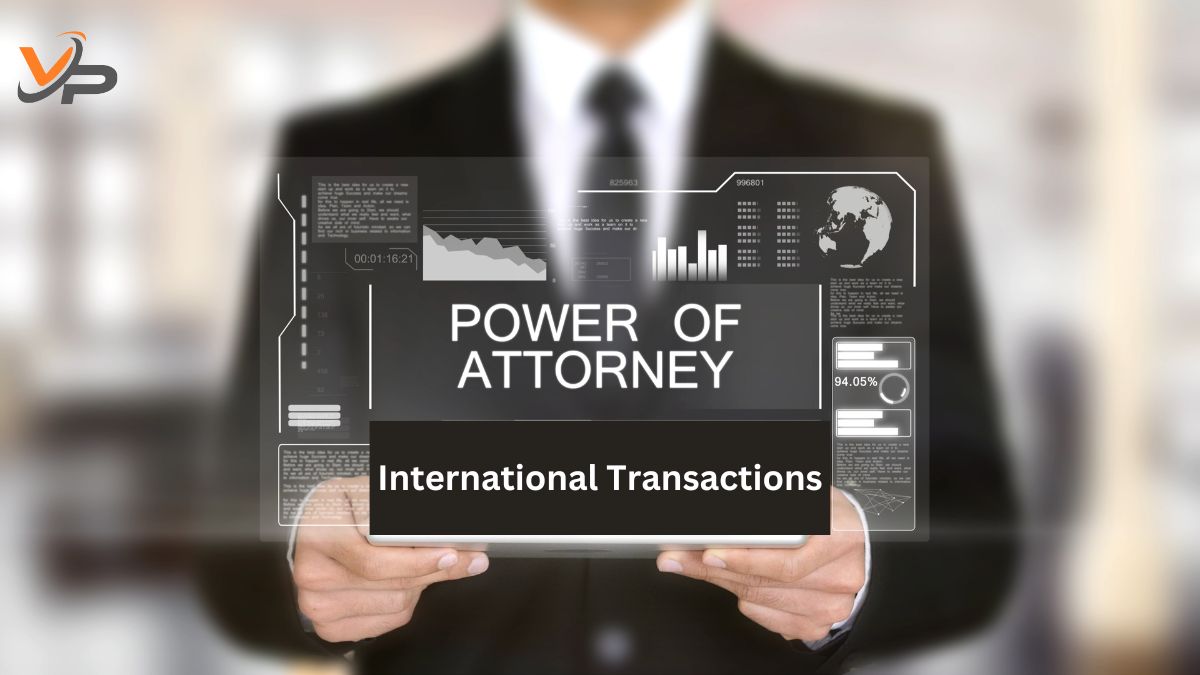
Introduction
In the present universal economy, particulars, and businesses generally get involved in transactions that go across borders so, you do require a power of attorney for international transactions. When maintaining these international dealings, one crucial legal tool is the Power of Attorney (POA).
A Power of Attorney gives an appointed person or body the legal authority to act on behalf of another in several matters, incorporating legal, financial, and business decisions.
This article explores the utilization of power of attorney for international transactions and key pointers for it.
Practical Uses of Power of Attorney for International Transactions
These are the practical utilization of this power of attorney for international transactions as follows:
-
Real Estate Transactions
- A POA permits the agent to sign contracts, move ownership, and maintain other legal rules in real estate transactions abroad, majorly when the principal cannot be available in the foreign country.
-
Corporate and Business Operations
- Multinational corporations usually use POAs to designate representatives to manage corporate things such as signing contracts, regulatory filings, and maintaining banking operations in foreign jurisdictions.
-
Cross-Border Investments
- Investors may utilize a POA to authorize agents to open brokerage accounts, maintain investment portfolios, or execute trades in international markets.
-
Litigation and Dispute Resolution
- When legal issues arise in foreign courts, a POA allows the principal to appoint an attorney or representative to manage litigation or arbitration on their account.
pointers for Considerations Power of Attorney for International Transactions
The key pointers to looking for your power of attorney for international transactions as follows:
1. Jurisdictional Compliance
Each country has its laws governing the formation, recognition, and execution of Powers of Attorney. When going with international transactions, it’s important to ensure that the POA adherence to the legal needs of all relatable jurisdictions. This may incorporate:
- Notarization and legalization: In some countries, POAs should be notarized and legalized by consulates or embassies to be proof for international use.
- Apostille certification: For countries that are parties to the Hague Apostille Convention, an Apostille certification may be needed to authenticate the POA.
- Language requirements: Some jurisdictions may need the POA to be translated into the local language, with the translation certified by an approved body.
2. Choice of Agent
Choosing a trustworthy and qualified agent is important, especially in international transactions where the agent may be making high-stakes decisions. The agent should have a proper knowledge of the legal and financial landscape of the related foreign jurisdiction.
- Consider designating a local representative or attorney known with the laws of the foreign country.
- Define the agent’s powers properly, specifying limits to their authority if required.
3. Scope of Authority
The Power of Attorney for international transactions should properly describe the scope of authority permitted to the agent. For international transactions, this might involve:
- Authority to negotiate and execute contracts
- Authority to open and maintain foreign bank accounts
- Authority to handle tax affairs in foreign jurisdictions
- Authority to show the principal in legal matters abroad
A well-drafted POA will lessen the risk of misunderstandings and ensure that the agent can act successfully and legally on the principal’s behalf.
4. Revocation and Duration
When drafting a Power of Attorney for international transactions, it is significant to identify when the authority ends. This can be:
- A fixed period, after which the POA expires automatically
- Revocation upon the completion of a selective transaction
- Indefinite duration, with the correct of the principal to cancel it at any time (with proper notice)
Ensure that mechanisms are in place for canceling the POA, majorly if the principal or agent is located in a other country. Notification of revocation must adhere to the laws of the jurisdictions involved.
5. Tax and Financial Implications
International transactions generally incorporate complex financial and tax considerations. The agent should have the authority to look into these issues such as:
- Adherence with local tax laws and regulations
- Filing needful tax returns or declarations
- Maintaining foreign bank accounts and financial assets
In some cases, international transactions would trigger tax liabilities in various countries, making it significant to work with tax professionals who know cross-border tax obligations.
Conclusion
A Power of Attorney for international transactions is a crucial tool for maintaining international transactions, giving flexibility and efficiency when going with cross-border financial, legal, and business affairs. However, to ensure its efficacy, it is important to know the legal requirements in all related jurisdictions and to draft the POA with care.
Consulting legal experts who specialize in international law can aid ensure that the POA is correctly structured and enforceable, permitting seamless and victorious transactions across borders.
By choosing a capable agent and defining their powers properly, a principal can manage control over their matters, even when dealing with difficult and geographically distant transactions. So get it and other Power of attorney for financial matters done from VIP PRO Services who are skilled in their work.



